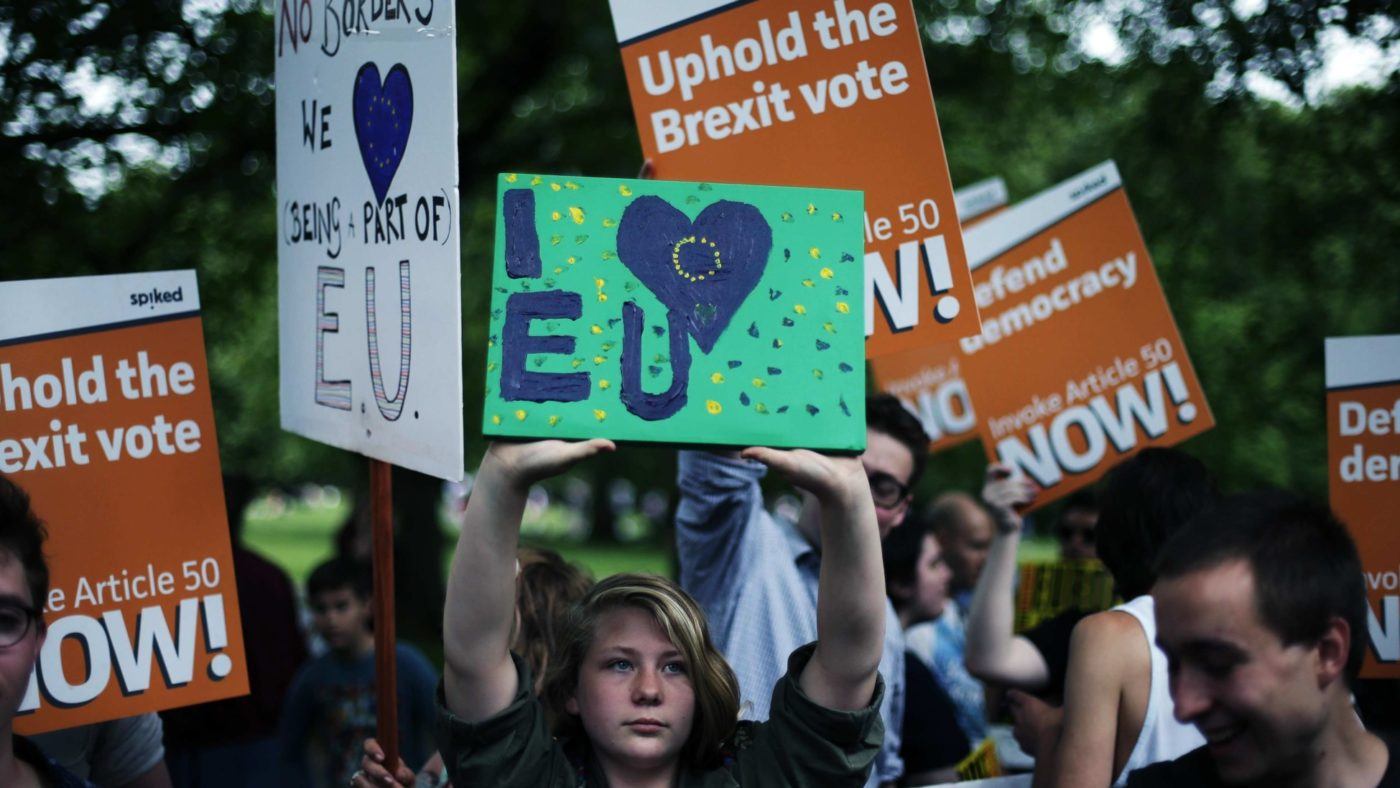It felt like Groundhog Day – or rather, Groundhog Night. On stage, Will Straw, the head of the Stronger In campaign, was calling for Britain to stay in the single market and the customs union, to accept free movement of people with some sort of emergency brake. Matthew Elliott, his counterpart from Vote Leave, was insisting that keeping any of them would be a betrayal not just of the Tory and Labour manifestos, but of the millions who voted for Brexit.
From the crowd, cheers and boos rang out from Remainers and Leavers as their champions made their points. “Garbage!” “Lies!” hissed the man behind me whenever an Outer spoke up.
The event, hosted by the UK in a Changing Europe, was meant to be a look back at the referendum campaign to mark its one-year anniversary. But in the wake of the election result, it felt like the whole Brexit debate had been ripped back open. And it was readily apparent that with the passing of time, precious little had been forgotten, or learned – or solved.
Straw’s position was that the swing against the Tories represented a vote against Theresa May’s manifesto – and hence a rejection of her vision of “hard Brexit”. Elliott’s was that Labour’s own manifesto was just as clear that we would be leaving the single market, even if some on the Opposition benches don’t seem to have read it.
I wrote in CapX’s weekly briefing (sign up here) about how hard it’s going to be to get any kind of Brexit through: Straw seemed pretty confident that there’s a blocking majority in Parliament against May’s current strategy, and it’s equally hard to see how a Brexit-lite deal could get through.
But the evening brought home another, subtler point – which is that the strategic positions of the Leave and Remain camps have flipped.
Stronger In took great pride in building a “rainbow coalition”. But that, as Straw admitted, boxed it in. Having to agree policy with the Greens, the Lib Dems, Labour (when they could be bothered to answer the phone) and especially with David Cameron and his team in No 10 led to a certain flat-footedness.
One of Vote Leave’s strengths, by contrast, was that it was a tight, disciplined and focused operation. By distancing themselves from Nigel Farage, Elliott and his campaign director, Dominic Cummings, not only detoxified the Brexit brand, but gave themselves the freedom to run the campaign their way.
The upshot was that Vote Leave could dance around, punching and jabbing, and Stronger In couldn’t really fight back effectively – especially since Cameron and George Osborne wouldn’t countenance the kind of personal attacks on Boris Johnson and Michael Gove that might have made it hard to bring the Tory party back together afterwards.
This wasn’t the only disadvantage of incumbency. Vote Leave were determined not to outline, at least in too much detail, what Brexit might look like – largely because the various members of their coalition, and the wider Eurosceptic movement, had very different ideas. And during the campaign, they mostly didn’t have to (although for the record, one thing which both Remain and Leave were explicit about was that Brexit meant leaving the single market).
But now, things are different. For all the criticism made of it, there’s nothing ludicrous about Theresa May’s Brexit strategy: it’s a fairly linear extrapolation of what both campaigns said Brexit means.
The problem is twofold. First, Mrs May is now the one with the coalition to keep happy – the one who must take into account the sensitivities of Tory hardliners and wavering ex-Remainers and a Chancellor preoccupied with the demands of the business community.
Second, Mrs May has pinned herself down. Just as Cameron and Osborne were pinned to membership on the current terms (or at least under the terms of a renegotiated deal so unpopular that they immediately stopped talking about it), so she has set out her definition of what Brexit means.
This not only opens her up to criticism from everyone with their own ideas. It gives Labour the same advantage previously enjoyed by Vote Leave.
The party’s strategic masterstroke at the election – perhaps entirely accidentally – was its policy of constructive ambiguity. The manifesto made clear that Brexit would happen, but this bitter pill was coated with sugary denunciations of a callous, heartless, hard, Tory Brexit. The result was a party that was pro-Leave enough to keep working-class voters and pro-Remain enough to attract the middle classes.
Indignant Tories have been consoling themselves that, as the Brexit negotiations proceed, Labour will have to get off the fence – and thereby forfeit a chunk of support. But will it? It’s easier to imagine Keir Starmer, John McDonnell et al sitting there with pious looks on their faces, tutting at every move Theresa May and David Davis make. What sort of Brexit does Labour want? Not this one, they’ll reply.
It could be that all this is beside the point: that as negotiations grind on, the options will constrict in such a way as to force Britain’s hand. (On this score, Europe’s insistence on the inviolability of the four freedoms may well be the key factor in the negotiations.)
But as I wrote on Saturday, time also works against the Leavers. The tighter things get, the more a low-ambition, low-disruption take on Brexit becomes attractive – even if it doesn’t actually look much like Brexit at all. (At the extreme, you end up with a deal where we lose our MEPs and Commissioners, and that’s pretty much it.)
A month ago, it felt like Britain had finally come to terms with its departure from the European Union. Now, it feels like those who won the argument back in June 2016 need to fight to defend their victory.


